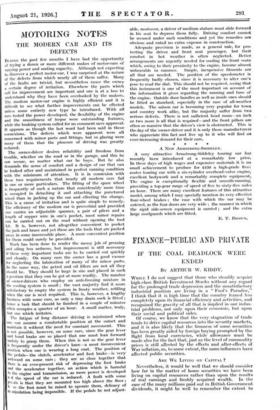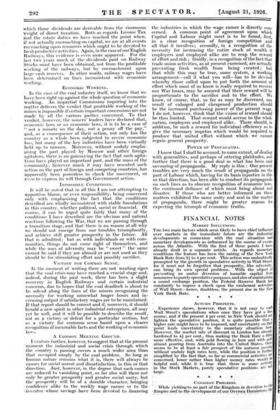FINANCE - PUBLIC AND PRIVATE
IF THE COAL DEADLOCK WERE ENDED
BY ARTHUR W. KIDDY.
WHILE I do not suggest that those who steadily acquire high-class British Investment Stocks without any regard for the prolonged trade depression and the unsatisfactory industrial position are living in a "Fool's Paradise," I think that it is high time that the country leaned less completely upon its financial efficiency and activities, and recognized the gravity of all that is implied in our indus- trial problems, not only upon their economic, but upon their social and political sides.
Of course, we know that the very stagnation of trade tends to drive capital resources into the security markets, and it is also likely that the firmness of some securities has been greatly aided by foreign buying prompted by the flight from local currencies, while allowance must be made also for the fact that, just as the level of commodity prices is still affected by the effects and after-effects of War inflation, so, to some extent, the same influences have affected public securities.
ARE WE LIVING ON CAPITAL?
Nevertheless, it would be well that we should consider how far in the matter of home securities we have been living on capital resources rather than upon the results of real earnings and freshly acquired wealth. In the case of the many minions paid out in British Government dividends, it might be well to remember the extent to which those dividends are derivable from the enormous Weight of direct taxation. Both as regards Ineome Tax and the estate duties we have reached the point when, if not actually encroaching on capital, we are at all events encroaching upon resources which ought to be devoted to fresh productive activities. Again, in the case of our English Railways, this evidence is even more apparent. For the last two years much of the dividends paid on Railway Stocks must have been obtained, not from the profitable working of the railways, but by encroachment upon large cash reserves. In other words, railway wages have been determined on lines inconsistent with economic working.
ECONOMIC WORKING.
In the case of the coal industry itself, we know that we have been right up against the whole question of economic working. An impartial Commission inquiring into the matter delivers the verdict that profitable working of the mines is impossible if certain important concessions are not made by all the various parties concerned. To that verdict, however, the miners' leaders have declared that, economic laws or no economic laws, it is to be a case of ". not a minute on the day, not a penny off the pay," and, as a consequence of their action, not only has the country as a whole been subjected to severe economic loss, but many of the key industries have been virtually held up to ransom. Moreover, without unduly empha- sizing the part played by Moscow and other foreign agitators, there is no gainsaying the fact that such a,,,ita7 bons have played an important part, and the mass of the 'community, however much it may have resented such action on the part of foreign and competing countries, has apparently been powerless to check the movement, or even to express its will through Government action.
IM POSSIBLE CONDITIONS.
It will be noted that in all this I am not attempting to apportion blame, or even responsibility, being concerned only with emphasizing the fact that the conditions described arc wholly inconsistent with stable foundations in this country, whether political, social or financial. Of course, it can be urged quite fairly that many of the conditions I have described are the obvious and natural reactions following the War, that we are passing through a transition stage, and that there is no reason at all why we should not emerge from our troubles triumphantly, and achieve- still greater prosperity in the future. All that is admitted ; but as with individuals so with corn- munities, things do not come right of themselves, and while the uses of adversity may be " sweet " the same cannot be said if they are abused or are not used as they should be for -stimulating effort arid possibly sacrifice.
VICTORY 'FOR COMMON SENSE.
At the moment of writing there are not wanting signs that the coal crisis may have reached a crucial stage and, indeed, during the past week, there has been a slight recovery in English Railways and certain industrial .concerns, due to hopes that the coal deadlock is about to -be solved along the lines of the miners recognizing the necessity for workinab somewhat longer hours and in- creasing output if satisfactory wages are to be maintained. ,If that report should be correct and if, moreover, it should herald a new spirit in other industrial enterprises, all may yet be well, and it will be possible to describe the result, not as a victory or defeat for a particular section, but as a victory for common sense based upon a clearer ,recognition of inexorable facts and the working of economic Jaws.
• A COMMON MEETING GROUND.
I venture further, however, to suggest that at the present '.moment the industrial and social crisis through which the country is passing covers a much wider area than that occupied simply by the coal problem. So long. as human nature remains what it is, there will always be causes for social unrest and dissatisfaction, in this or that • direction. Just, however, in the degree that such causes are reduced to vanishing point, so far also will there not only be greater prosperity and greater social unity, but • the prosperity will be of a durable character, bringing • eonfidenee alike to. the weekly wage earner or to the *investor:whose savings have been devoted to -financing the industries in which the wage earner is directly con- cerned. A common point of agreement upop which Capital and Labour might meet is to be found,. first, in a clear recognition of :foreign competition and all that it involves ; secondly, in, a recognition of the necessity for increasing the entire stock of wealth if employers and employed alike are to reap the reward of effort and risk ; thirdly, in a recognition of the fact that trade union activities, as at present exercised, are actually preventing fresh wealth from being 'created ; but that while this may be true, some system, a working arrangement—call it what you will—has to be devised whereby those called upon to put forth the amount of effort which most of us know is really required to recover our War losses, may be assured that their reward will be proportionate to the sacrifice and to the -effort. We know, of course, that, 'so far as may be diseerned, one result of enlarged and cheapened production should be the increased purchasing power of the present wage. I do not, however, think that the vision of reward should be thus limited. - That reward would accrue to the whole nation, employers and employed alike. There should, in addition, be such a reward for individual efficiency as to give the necessary impetus which Would be required to produce that united effort without which we cannot regain general prosperity.
POWER OF PROPAGANDA.
I know that I shall be accused, to some extent, of dealing with generalities, and perhaps of uttering platitudes, and further that there is a good deal in what has been said savouring of propaganda. My reply is this : Our present troubles are very much the result of propaganda on the part of Labour which, having for its basis injustice in this or that direction, has been able to conduct its prbpaganda on such lines as to obscure recognition of economic laws, the continued defiance of which must bring about real disaster. If those who are better informed on these matters exhibited the same unity and zeal in the -matter of propaganda, there might be greater reason for expecting the triumph of economic truths.



































 Previous page
Previous page